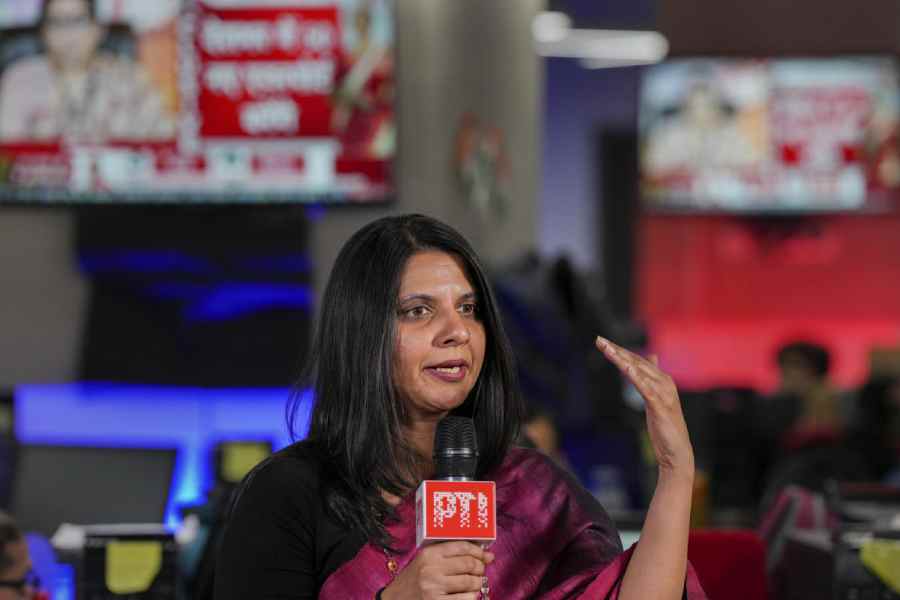India’s premier and beleaguered think-tank, the Delhi-based Centre for Policy Research (CPR), on Tuesday announced that its president and chief executive Yamini Aiyar will step down at the end of March.
Yamini, a consistent policy critic of the Narendra Modi government, had just published a scathing piece in The Economist titled “Yamini Aiyar laments the damage done to Indian democracy under Narendra Modi”. The article may not have had anything directly to do with her decision to step away from CPR’s leadership, though; sources told The Telegraph that the decision on a change at the helm in CPR pre-dated the publication of her latest article.
In January, the Modi government had cancelled the Foreign Contribution Regulation Act (FCRA) licence of the 50-year-old think tank, with which some of the most prominent public intellectuals and research scholars have been associated over the decades. The government action followed allegations of violation of the foreign funding law. This left the CPR severely depleted for both funds and personnel; it is currently down to a team of merely 20-odd.
In its statement, the CPR said: “The Board expresses its appreciation for her excellent and significant contribution to CPR’s tradition of engaged multidisciplinary scholarship and for the energy, commitment, and sense of purpose she brought to her role during her tenure. We wish her the very best in her future endeavours.”
The statement said Dr Srinivas Chokkakula, senior fellow at the CPR and Ministry of Jal Shakti Research Chair, would take over as the think tank’s president and chief executive from April 1. He has been with the CPR since 2010.
In a post on X, Aiyar said the CPR’s “fierce intellectual independence and democratic spirit have enriched her enormously”.
“An absolute privilege to have led and fought for this remarkable institution. CPR’s fierce intellectual independence and democratic spirit have enriched me enormously. Delighted that @CPR_India leadership will now be in the very capable hands of my wonderful colleague Srinivas,” she said.
In her opinion piece published in The Economist on March 23, Aiyar wrote: “A dark shadow of creeping authoritarianism looms over India as it prepares for its 18th general election. The incumbent Bharatiya Janata Party government of Narendra Modi is set to win a third term and surveys show that the prime minister’s personal popularity is at an all-time high.
“But his governance, built on aggressive centralisation, legitimised by a cult of personality and undergirded by an exclusionary Hindu-nationalist ideology, is eroding India’s democracy. If unchecked, the consequences for the country’s political, economic and social fabric will be grim.”
She further wrote: “The most striking evidence of this is the fact that the space for the political opposition, media, academia and civil society to freely express their views is fast shrinking. Genuine democracy requires the active, public contesting of ideas and policy.”
“In its place, the government is systematically weaponising investigative agencies, tax laws, sedition laws, anti-terror laws and laws regulating foreign funding of NGOs to disproportionately target opposition politicians and criminalise dissent.”
The CPR’s governing body is chaired by Meenakshi Gopinath, a political scientist who taught at Jawaharlal Nehru University and was the principal of Lady Shri Ram College in Delhi. Former foreign secretary Shyam Saran is one of the board members. The board’s former members include former Prime Minister Manmohan Singh and former Chief Justice of India Y.V. Chandrachud, whose son Justice D.Y. Chandrachud is the current Chief Justice of India.
The CPR was earlier headed by academic Pratap Bhanu Mehta, also a critic of the Modi government. The CPR’s partners and donors include reputable international and national organisations ranging from government institutions to non-profits, educational institutions and civil society.
The Bill and Melinda Gates Foundation, the University of Pennsylvania, the World Resources Institute and Duke University are among the donors, officials said.
The institution is globally recognised for its academic and policy excellence. Full-time and visiting scholars at the CPR include members of the Niti Aayog, former diplomats, civil servants, members of the Indian Army, journalists and leading researchers.
Over the past nine years, the Modi government has tightened the rules and procedures for NGOs to receive and use foreign funds. It has cancelled the FCRA licences of hundreds of NGOs on the charge of violating the law’s provisions.
The crackdown has led civil society groups to accuse the government of trying to stifle dissent.
The FCRA licence is mandatory for any NGO or association to receive foreign funds.










